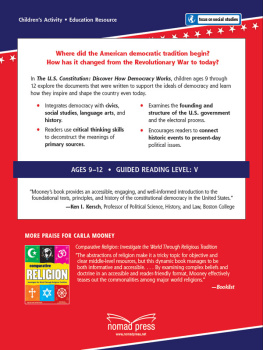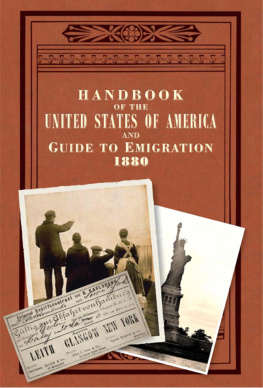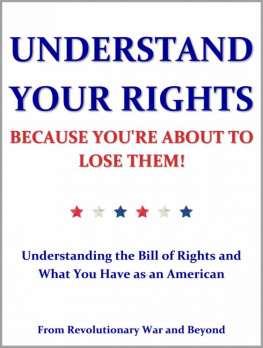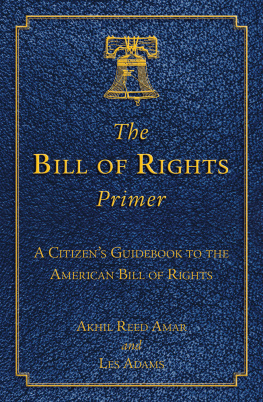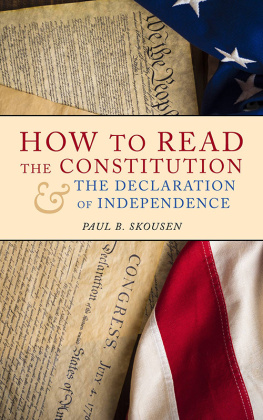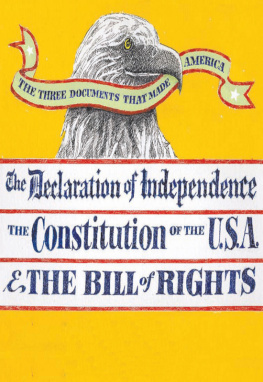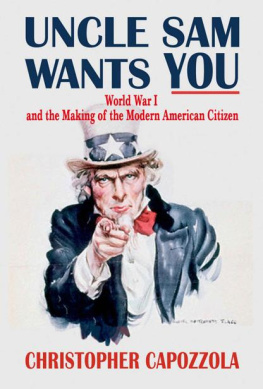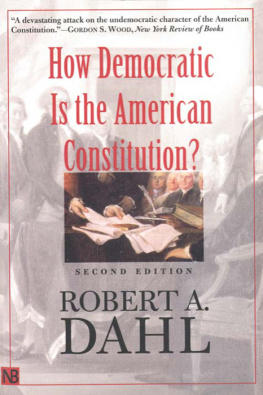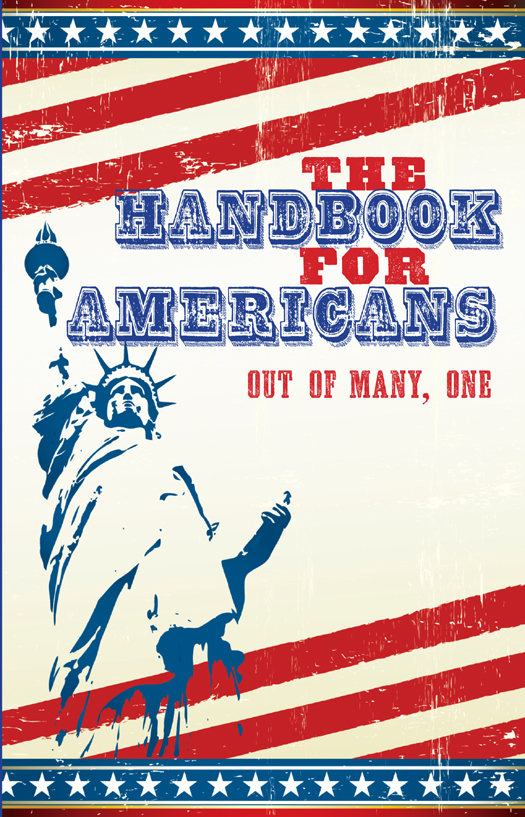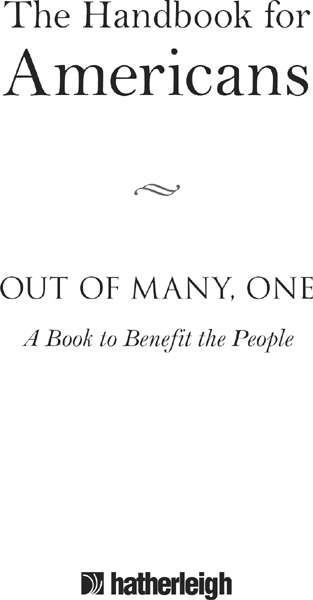T OO OFTEN WE AS A MERICAN CITIZENS take a wait and see attitude towards events. We go about our daily lives, assuming and hoping that someone else will take care of things. Someone in City Hall, or the state capital, or in Washington. Well, we are that someone else. And we need to take responsibility now.
It was Robert F. Kennedy who said, The future does not belong to those who are content with today, apathetic toward common problems and their fellow man alike, timid and fearful in the face of bold projects and new ideas. Rather, it will belong to those who can blend passion, reason and courage in a personal commitment to the great enterprises and ideals of American society.
Passion, reason and courage: these are the lifeblood of American citizenship.
Andrew Flach, Publisher
11 PRINCIPLES FOR
EVERYDAY CITIZENSHIP
H ERE IS A LIST OF ELEVEN THINGS you can do to participate immediately as a citizen of the United States. Eleven simple things you can do to build what President Franklin Delano Roosevelt called a greater, a more stable and a more tolerant America. Because the ultimate success of our democracy rests upon the individual citizens who make up this great Nation.
Vote. By participating in elections at the local, state and national level, we make our opinions heard. Understand the issues. Learn as much as you can about the candidates. Vote responsibly.
Stay informed. Read newspapers, magazines, blogs. Talk to your friends, co-workers, neighbors. Go online and read current Bills before Congress. An educated American is an empowered citizen.
Exercise your right to free speech. When we articulately and intelligently state our opinions, popular or not, we truly live up to the hopes and dreams of the Founding Fathers. Freedom of speech is an extraordinary right.
Support American businesses. When we buy products labeled Made in USA, we are supporting our economy and creating jobs for our fellow citizens.
Support Americans in need. Katrina. Ike. Devastating forest fires. Our neighbors need us. Help your fellow Americans. Donate your time, services or money to those less fortunate than you.
Use your time meaningfully and wisely. Volunteer for local charities. Help out at the local school or nursing home. Organize a neighborhood clean-up. Lets all do what we can to support each other.
Reread our founding documents. The principles laid out in the Declaration of Independence, Constitution, and the Bill of Rights are timeless and essential. This countrys founders envisioned a future we are living out todayand we can turn to these documents whenever our democratic institutions and expectations are challenged and need to be reinvigorated.
Look to the past for perspective. Our Nations history is rich with moments when strength and resilience transcended hardship and adversity. Look to the lives of our great leaders, Presidents, and citizens for inspiration.
Teach the next generation. Like anything else, enlightened patriotism comes from education, not ignorance. Teach the children about the special rights and responsibilities we share as Americans, and how they can exercise those rights. Set the example by being a good citizen.
Enjoy and protect Americas natural resources. Conserve. Recycle. Help clean up a river or plant a tree. Our democracy deserves a home as beautiful as its ideals.
Above all else: Bet on Good. Believe in America. Believe that together we can forge a better future and better ways of doing things. Believe it, then do it.
TABLE OF CONTENTS
P ART I
P ART II
P ART III
P ART IV
THE AMERICANS CREED
I BELIEVE IN THE U NITED S TATES OF A MERICA as a government of the people, by the people, for the people; whose just powers are derived from the consent of the governed, a democracy in a republic, a sovereign Nation of many sovereign States; a perfect union, one and inseparable; established upon those principles of freedom, equality, justice, and humanity for which American patriots sacrificed their lives and fortunes.
I therefore believe it is my duty to my country to love it, to support its Constitution, to obey its laws, to respect its flag, and to defend it against all enemies.
W RITTEN 1917,
accepted by the United States
House of Representatives
on April 3, 1918
I
What it Means to be an American
I like to see a man proud of the place in which he lives. I like to see a man live so that his place will be proud of him.
Attributed to
ABRAHAM LINCOLN (18091865)
Sixteenth U.S. President
O UR RIGHTS AS A MERICANS are protected by the Declaration of Independence and the Constitution, the documents that founded this country. These great documents guarantee the basic freedoms and protections that are the right of every American, regardless of background, culture, or religion.
But the definition of American is not set in stone. It is a living, breathing identity, one we shape daily through our actions, at home and abroad. Freedom is one of many American principles which must be upheld and defended every day. We do that by participating actively in the political process and by being an active member of society and our communities.
How we will honor the words and intentions of our Founders while moving into the future is the true test of being an American.
We are America.
Every good citizen makes his countrys honor his own, and cherishes it not only as precious but as sacred.
ANDREW JACKSON (17671845)
Seventh President
of the United States
A BRIEF HISTORY OF THE UNITED STATES
A MERICAS HISTORY IS RICH with stories of determination and accomplishment in the face of challenge. With every trouble and every triumph, America has become stronger and wiser as a nation.

Discovery. The land mass that makes up the United States was originally home to a diverse population of native peoples. In 1493, Christopher Columbus became the first European to set foot on this sprawling continent when he landed in Puerto Rico on his journey to the New World. The Spanish, who were the first Europeans to colonize the New World, would establish New Spain from Mexico City to Florida to California during the 16th and 17th centuries.
The French occupied North America as well. Jacques Cartier led an expedition exploring the St. Lawrence River and the Gulf of St. Lawrence in Canada in 1534, and, by 1718, New France stretched from Newfoundland and the Hudson Bay (in what is now Canada) all the way down to Louisiana. The French colonies eventually included lands on the shores of the St. Lawrence River and Gulf of St. Lawrence, Acadia (modern-day Nova Scotia), much of the Great Lakes region, and Louisiana.
English settlement of the New World was more haphazard than Spanish and French colonization. During the first decades of the seventeenth century, settlements were established by trading companies and religious groups (like the Puritans at Massachusetts Bay Colony). some settlements were specifically set up as penal colonies.


